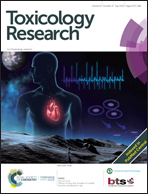Dendrimer-conjugated podophyllotoxin suppresses DENA-induced HCC progression by modulation of inflammatory and fibrogenic factors†
Abstract
Podophyllotoxin has been explored as an anticancer, antiviral, and antibacterial agent; however, its low water solubility and toxicity limit its use. In this study, the efficacy of a more soluble and less toxic polyamidoamine (PAMAM) dendrimer-conjugated podophyllotoxin (DPODO) was evaluated against chemically induced hepatocellular carcinoma (HCC) in mice. HCC was induced by giving 0.01% diethylnitrosamine (DENA) in drinking water for 16 weeks. The HCC-induced mice were treated with 10 or 20 mg per kg body weight DPODO. The DENA administration led to HCC development, characterized by anisocytosis, karyomegaly, inflammation and degenerative changes in the liver. The DPODO treatment at 10 mg and 20 mg doses significantly reduced the histopathological changes in liver tissue. The DPODO treatment also significantly lowered the levels of inflammatory markers IL-6 and NF-κB in serum and tissue, respectively. Further, the treatment also significantly reduced fibrous tissue deposition in the liver, which was further confirmed by the reduced mRNA levels and tissue expression of fibrogenic markers TGF-β and α-SMA in the liver. The results of the present study indicate that DPODO treatment suppresses the progression of HCC by modulating the inflammatory and fibrogenic factors, which play important roles in HCC development.



 Please wait while we load your content...
Please wait while we load your content...